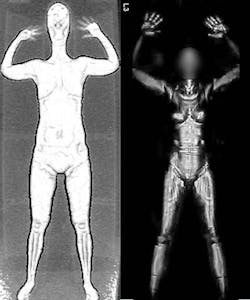Large Airports Replacing X-Ray Scanners With Millimeter Wave Scanners
The U.S. Transportation Security Administration (TSA) has been quietly replacing the old X-ray body scanner machines at the check points of large airports with millimeter wave scanners to ensure the "most efficient and effective use of security technology."
The new machines that have been installed at John F. Kennedy Airport in New York, Boston Logan International Airport, Los Angeles International Airport, Chicago O'Hare Airport and Orlando Airport, use radio waves instead of radiation, and display a cartoon image of a passenger's body to protect privacy.
"In an effort to ensure the most efficient and effective use of security technology, TSA is strategically reallocating backscatter advance imaging technology units in order to allow for expanded use of advanced imaging technology units at other airports," Lisa Farbstein, Office of Public Affairs of Transportation Security, Administration told Xinhua Monday.
According to TSA, earlier this year TSA began to reallocate some of the backscatter scanners from large airports to smaller ones. They are being replaced with millimeter wave scanners, which take up less space at the check points and can process passengers faster. The millimeter wave scanners also utilize the automated target recognition software, which enhances passenger privacy.
In a statement to Xinhua, TSA said "Advanced imaging technology is safe and meets national health and safety standards. Backscatter technology was evaluated by the Food and Drug Administration, the National Institute for Standards and Technology and the Johns Hopkins University Applied Physics Laboratory. All results confirmed that the radiation doses for individuals are well within safety standards."
Since the TSA started introducing such kind of scanners in 2009, they have been under severe criticism from those who feel the invasive body scanners are a violation of American freedom and the right of privacy.
Copyright 2012 Xinhua News Agency

